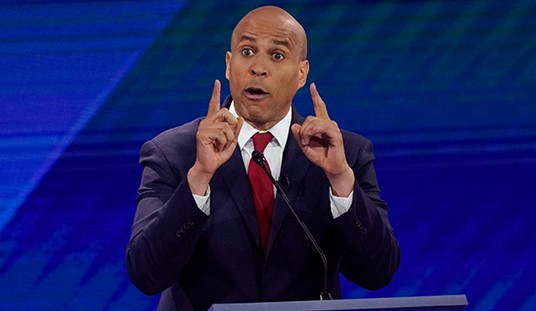Shortly after taking office in 2009, President Obama declared that a new strategy was forthcoming for the Afghan war. Over six months later, after weeks and weeks and weeks of “thoughtful deliberation” (and a few dozen rounds of golf), Obama used an awkward 45-minute appearance at West Point to boldly announce…that he was going to implement what amounted to the same strategy that President Bush and Secretary of Defense Gates had prepared just before the January 20, 2009 change of command. Bold and cutting-edge, that.
Now, as America winds down its Iraq obligation and feckless NATO blunders about 10,000 feet over North Africa, the President has another Afghan announcement to make. This one, though, is supposed to represent great news for the American people: the nearly ten-year war in Afghanistan (which may as well still be on the Dark Side of the Moon as far as many Americans are concerned) is ending, and we’re declaring ourselves the victors!
The details, as with every public pronouncement Barack Obama has made since he burst onto the national scene in 2004, are strikingly absent from this self-gratifying speech that Danielle Pletka has called “a campaign speech-cum-Hallmark card.”
For example, Obama declared: “Tonight, I can tell you that we are fulfilling that commitment. Thanks to our men and women in uniform, our civilian personnel, and our many coalition partners, we are meeting our goals.” Just what those goals are, and how we are “meeting” them, isn’t important; all the American people need to know is that things are so great in Afghanistan that we’re declaring, and sticking to, a strict timetable for the withdrawal of every one of our troops.
Never mind the fact that, once Obama has accomplished the promised withdrawal of the first 10,000 troops from Afghanistan by the end of this year, there will still be more American service members deployed there than at any time during the Bush presidency. Also never mind the fact that Afghanistan’s freedom and security post-US withdrawal appears to rely on a national defense force that can’t seem to work out its frustration in any other way than murdering western soldiers and civilians. The important thing to know is, Obama says we’re “starting our drawdown from a position of strength,” and that “Al-Qaida is under more pressure than at any time since 9/11” (an interesting assertion, given the pressure they were under immediately after 9/11, when the fury of the U.S. military was being unleashed on AQ’s safe haven and on those who had provided it to them).
As Pletka put it, this speech was:
a pablum-filled address that told the American people “we are fulflililng our commitment” (how?), “meeting our goals” (which ones?), “starting our drawdown from a position of strength” (in the East?), but “huge challenges remain” (duh).
The president spoke of the goal of denying safe haven to al Qaeda, but didn’t outline how that will be done in the provinces in which we have not yet begun to fight due to troop shortages. Rather, we are simply to “take comfort in knowing that the tide of war is receding.” Apparently, “the light of secure peace can be seen in the distance.” Seriously, who writes this stuff?
Further, buried in the middle of the 2,000-word speech was the declaration that the “political settlement” which is necessary for “peace [to] come to a land which has known so much war” will include the Taliban. Yes, that Taliban, in case you were wondering – the same al Qaeda-harboring terrorist organization that tyrannized Afghanistan and created a safe haven for international terrorists until we drove them from power after 9/11.
This naturally brings us to the question of just what the goal in Afghanistan was and is – a question to which the answer was clear nine-plus years ago, but which has gotten hazier and hazier as Americans have increasingly focused on other things, like the war in Iraq, the war in Libya, and the worst economy and president since (at least) Jimmy Carter. If the goal in Afghanistan was to permanently remove the Taliban from power and to destroy the al Qaeda terror network – or at very least to render them impotent in Afghan and international affairs – then inviting the Taliban back to the table in an effort to extricate ourselves from a decade-long war is tantamount to declaring almost total defeat.
If, as has been said more recently, the goal was to “punish al Qaeda and the Taliban,” then that mission could have been declared accomplished by November 2001, and we all could have been spared the effort of, and the rhetoric which has accompanied, the Global War on Terror. If, on the other hand, the goal was to permanently remove the Taliban from power, neuter or destroy al Qaeda, and leave behind an Afghanistan that was domestically stable, secure, and free of terrorists, and which wasn’t a threat to its own free people, to its neighbors, or to the rest of the world…well, how many more decades do you have to give?
Rather than address these questions head-on, of course, Obama declared tonight to be Arts and Crafts time and threw together a few of his favorite creations: Straw Men. He said:
Already this decade of war has caused many to question the nature of America’s engagement around the world. Some would have America retreat from our responsibility as an anchor of global security, and embrace an isolation that ignores the very real threats that we face. Others would have America overextend ourselves, confronting every evil that can be found abroad. We must chart a more centered course.
This “more centered course,” apparently, means more drone attacks on high-value targets around the world (“When threatened, we must respond with force — but when that force can be targeted, we need not deploy large armies overseas”) and more “leading from behind” while we, the UN, and NATO make fools of ourselves in months-long air campaigns that fail to unseat a single tinpot dictator (“When innocents are being slaughtered and global security endangered, we don’t have to choose between standing idly by or acting on our own. Instead, we must rally international action, which we are doing in Libya”). Personally, I would like to have seen one of Obama’s straw men come to life and debate him over such a ridiculous statement.
At around the three-quarters mark of his speech, Obama suddenly made a pivot to domestic economics and “nation building here at home.” This non sequitur seemed absurdly out of place in what was ostensibly a foreign policy speech (albeit one which was very light on the “policy” portion of that), and sends a fairly clear message that Obama simply lacks the capacity to focus on foreign and domestic affairs – particularly when caught up in the most important activity of all: campaigning for reelection.
As with the portion of his Afghanistan speech that actually dealt with Afghanistan, the portion of Obama’s Afghanistan speech that (inexplicably) dealt with the U.S. economy was vague, lacked specifics, and glossed over intricate yet important issues. However, that which can be gleaned from his economic contents is an example of how rigidly ideological and truly tone-deaf this president is. His words:
Now, we must invest in America’s greatest resource — our people. We must unleash innovation that creates new jobs and industry, while living within our means. We must rebuild our infrastructure and find new and clean sources of energy. And most of all, after a decade of passionate debate, we must recapture the common purpose that we shared at the beginning of this time of war.
In other words, (1) the economy is Obama’s 9/11, and therefore the country should rally to his far-left economic policy as it did to the flag in the days after Taliban-harbored al Qaeda terrorists attacked the American homeland; and (2) the policy to which we should all rally is one of pure government investment in, and control over, innovation, production, infrastructure, and overall economic direction. “Obama’s 9/11” or no, that’s not a prospect that many people are going to be hopping on board with at this post-stimulus, over-9% unemployment time in America.
Whatever you do, though, don’t forget tonight’s declaration of success in a war whose purpose most Americans have long forgotten — just don’t ask how that success was achieved, how it’s being defined, or how long it can be expected to last.













Join the conversation as a VIP Member